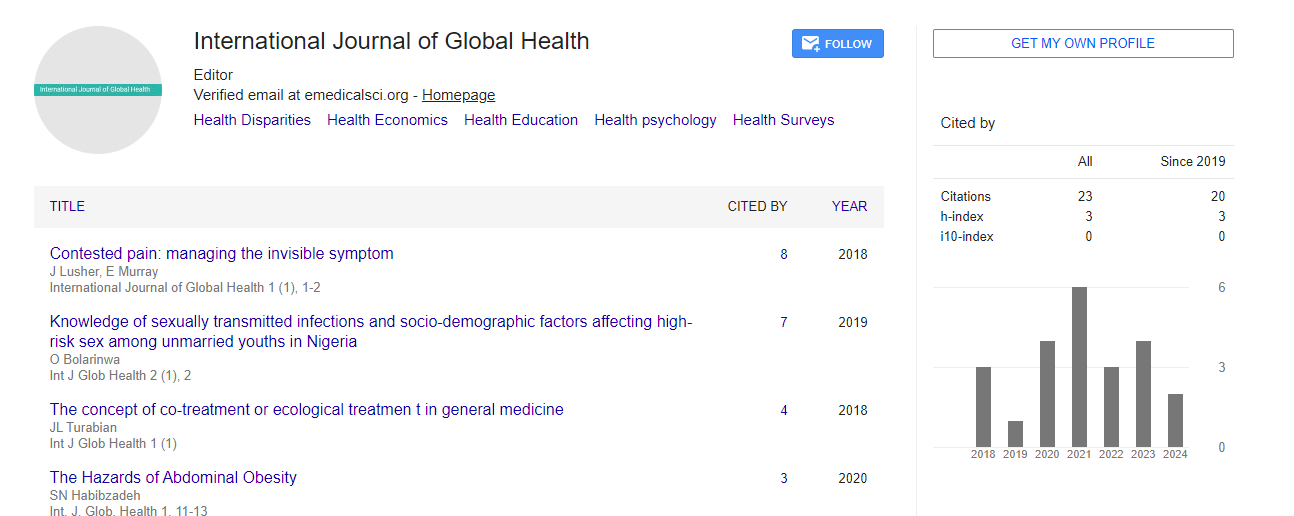Perspective, Int J Glob Health Vol: 6 Issue: 1
Urban Health: Challenges and Strategies for Improved Well-being in Urban Communities
Chiara Marchesani*
Department of Health, University of Birmingham, Birmingham, UK
*Corresponding Author: Chiara Marchesani
Department of Health, University of Birmingham
Birmingham, UK
Email: marchesani@gmail.com
Received date: 21 February, 2023, Manuscript No. IJGH-23-96056;
Editor assigned date: 23 February, 2023, PreQC No. IJGH-23-96056 (PQ);
Reviewed date: 09 March, 2023, QC No. IJGH-23-96056;
Revised date: 16 March, 2023, Manuscript No. IJGH-23-96056 (R);
Published date: 23 March, 2023, DOI: 10.4172/Ijgh.1000172
Citation: Marchesani C (2023) Urban Health: Challenges and Strategies for Improved Well-being in Urban Communities. Int J Glob Health 6:1.
Description
Urbanization is a global phenomenon, with more than half of the world's population now living in urban areas. While cities offer many advantages, such as access to healthcare facilities, education, and economic opportunities, they also pose unique challenges to public health and well-being. Urban health is a multidimensional concept that encompasses physical, mental, social, and environmental aspects of health in urban settings. In this article, we will explore the challenges faced by urban communities in maintaining good health, and the strategies that can be employed to improve urban health outcomes.
Challenges in urban health
Environmental pollution: Urban areas are often characterized by high levels of environmental pollution, including air pollution, water pollution, and noise pollution. Air pollution from vehicular emissions, industrial activities, and other sources can lead to respiratory and cardiovascular diseases, and even premature death. Water pollution from inadequate sanitation and waste management can result in waterborne diseases, such as diarrhea and cholera. Noise pollution from traffic, construction, and other urban activities can cause hearing loss, sleep disturbances, and mental health issues. The exposure to environmental pollution in urban areas can significantly impact the health and well-being of urban residents, especially vulnerable populations such as children, elderly individuals, and those with preexisting health conditions.
Socioeconomic disparities: Urban areas often exhibit significant socioeconomic disparities, with disparities in income, education, and access to healthcare. Low-income neighborhoods in cities may lack access to quality healthcare facilities, nutritious food, and safe recreational spaces, which can lead to poor health outcomes. Limited access to education and employment opportunities can also impact health and well-being in urban communities. Socioeconomic disparities can contribute to health inequities, where certain populations, such as minority groups and marginalized communities, are disproportionately affected by health issues in urban areas.
Unhealthy lifestyles: Urban lifestyles can be associated with unhealthy behaviors, such as poor diet, physical inactivity, tobacco use, and excessive alcohol consumption. Fast-paced urban lifestyles may lead to a reliance on unhealthy fast food, limited opportunities for physical activity, and increased stress levels. Unhealthy behaviors can contribute to the development of chronic diseases, such as obesity, diabetes, and cardiovascular diseases, which are significant public health challenges in urban areas. Additionally, mental health issues, such as stress, anxiety, and depression, can be exacerbated by urban living conditions, leading to negative impacts on overall health and well-being.
Urban planning and design: Urban planning and design play an important role in shaping the health and well-being of urban populations. Poorly planned and designed urban environments can result in inadequate access to essential services, such as healthcare facilities, parks, and public transportation, which can impact health outcomes. Lack of green spaces, sidewalks, and cycling lanes can limit opportunities for physical activity and contribute to sedentary lifestyles. Urban sprawl, characterized by low-density development, can lead to increased dependence on cars, longer commutes, and reduced opportunities for physical activity, which can contribute to poor health outcomes.
Strategies for improved urban health
Multisectoral approach: Addressing the complex challenges of urban health requires a multisectoral approach, involving collaboration between various stakeholders, including government agencies, urban planners, healthcare providers, community organizations, and residents. A multisectoral approach can help identify and address the social, economic, environmental, and behavioral determinants of health in urban communities. Collaborative efforts can lead to policies and interventions that promote health equity, reduce environmental pollution, improve access to healthcare and education, and produce healthier urban environments.
Promoting healthy lifestyles: Promoting healthy lifestyles in urban communities can help reduce the burden of chronic diseases and improve overall health outcomes. Health education programs, community-based interventions, and policy initiatives can promote healthy behaviors, such as healthy eating, regular physical activity, tobacco cessation, and responsible alcohol consumption. These efforts can be tailored to the specific needs and cultural norms of urban communities, and can include initiatives such as community gardens, farmers markets, walking and cycling infrastructure, and safe recreational spaces. Collaborative efforts between local governments, healthcare providers, and community organizations can help raise awareness about the importance of healthy lifestyles and provide resources and support to individuals and families in urban areas.
 Spanish
Spanish  Chinese
Chinese  Russian
Russian  German
German  French
French  Japanese
Japanese  Portuguese
Portuguese  Hindi
Hindi 
